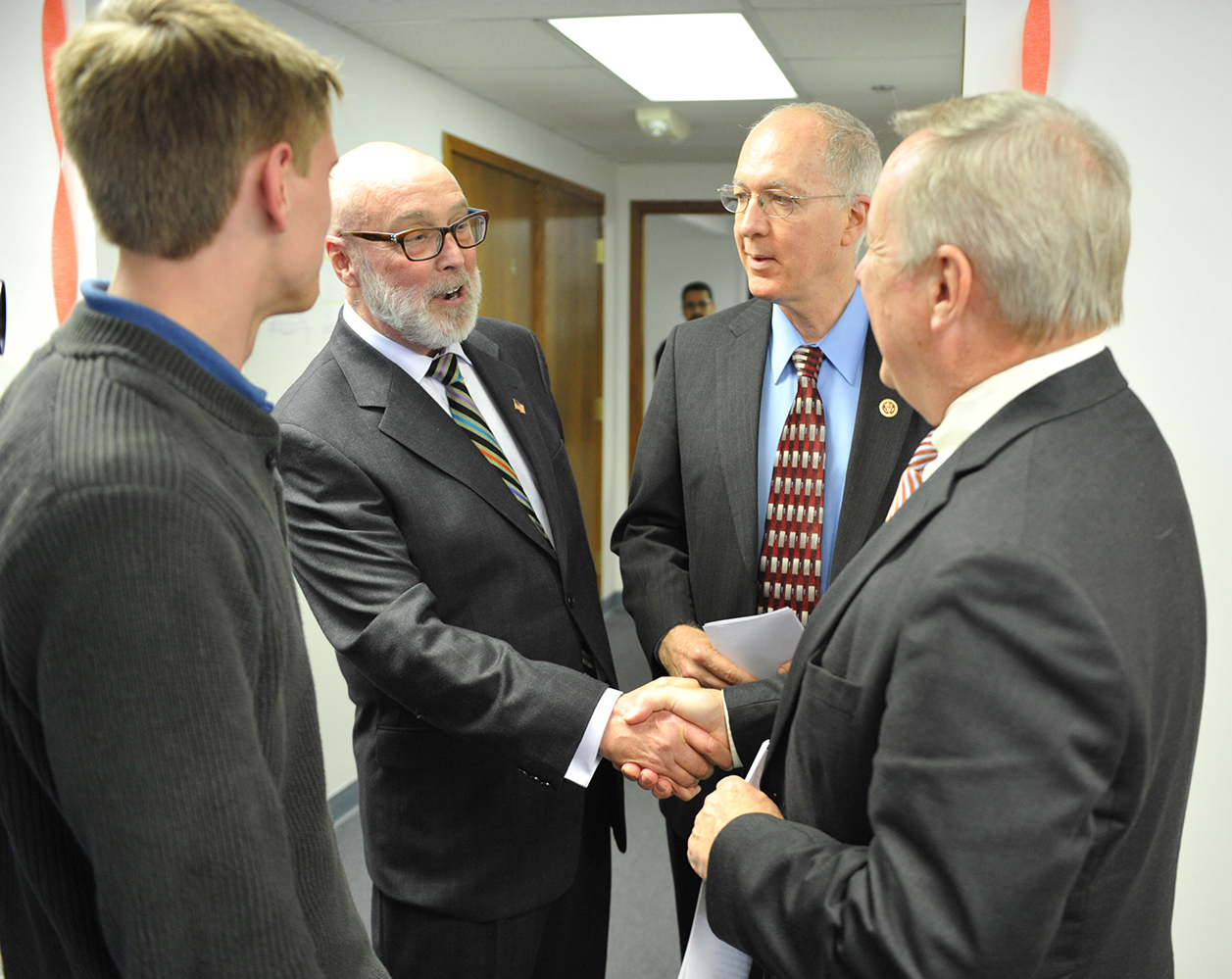
Aurora Mayor Tom Weisner, second from left, shakes hands with Sen. Dick Durbin as Rep. Bill Foster, second from right, looks on. With a minimum wage referendum on the Illinois ballot this November, all the men recently met in Aurora to discuss raising the minimum wage. Pat Barcas/staff photographer

By Pat Barcas
Staff Writer
Thursday, Oct. 9, 2014
Email Pat Barcas at: pat@foxvalley
labornews.com
AURORA — U.S. Sen. Dick Durbin, and U.S. Rep. Bill Foster hosted a discussion Oct. 8 at Foster’s Aurora office, encouraging a national minimum wage increase to $10 per hour.
Mayor Tom Weisner, and two local minimum wage workers struggling to make ends meet financially, joined them at the press conference. There is a minimum wage referendum on the ballot in Illinois this November.
“It’s unacceptable in America, that you can get up and go to work every day, and still be living in poverty. That’s why we believe, we ought to raise the minimum wage in this country,” said Durbin.
Illinois is currently at $8.25 per hour, above the national average of $7.25 per hour.
“That’s not enough, we’ve got to move this up to at least $10 per hour,” said Durbin. “We’re encouraging voters to stick with it. Down at the bottom of the ballot, this is one of the critical questions.”
Durbin said his challenger this fall, Jim Oberweis, has one of the most “bizarre ideas in history about minimum wage.”
“He says it will be against the law to give an increase in minimum wage to anyone under the age of 26. Who would that include? Students, single moms raising kids, a lot of women, and it would include returning veterans under the age of 26. What is he thinking?” questioned Durbin. “He’s completely out of touch with the reality that people are facing today.”
Two constituents currently working minimum wage jobs joined the press conference to explain how a hike would help them in their day to day lives.

Joliet resident Donna Dyxin shares her story of financial setbacks with Sen. Dick Durbin. She earns $8.46 an hour. Pat Barcas/staff photographer
Jesse Garner of Aurora is a student who works at Home Depot and has to commute to Sugar Grove. Donna Dyxin of Joliet said she and her husband were laid off, and now struggle to support her four children.
She said she suffered financial setbacks right when getting ready to retire. Her house has been in a no default foreclosure for the last six years.
“To say that money has been tight in the recent years is an understatement,” she said. “We have tried many ways to make ends meet. I now work retail for $8.46 an hour. I call it my slave labor job.”
She said she works as many hours as possible, only up to 39 and three quarters.
“Otherwise, I would be considered full time,” she said. “A raise to even $10 would be a big boost for us. It would at least mean an extra $65 per week. That money would help us pay some of our medical costs before we get to retirement.”
Weisner said the minimum wage increase is critically important to Aurora and to the entire nation.
“I am reminded of some words from Abraham Lincoln. He talked about the idea of ‘you work the fields, you harvest the crops, but you bring the fruits of your labor to someone else.’ That is fundamentally wrong. In order for democracy to thrive, it has to recognize the inherent dignity of work,” said Weisner.
